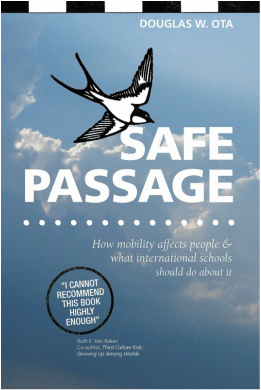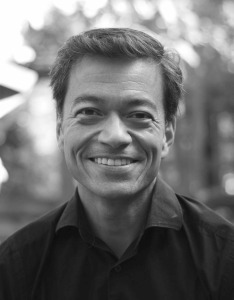 JP: Tell us about Safe Passage. What is it about? Can you describe it in just a few sentences?DWO: Safe Passage explains what mobility does to people. When people you care about come and go from your life, it does something to you. It doesn’t matter whether you’re the one who moves, or the one who is moved away from. You’re hit by loss and grief. When you lose lots of people and places at the same time, it can feel like a profound loss—like your entire life got erased. And yet, far too often, these types of losses remain insufficiently named and addressed by schools. Safe Passage offers a three-part remedy to these gaps by first explaining what happens psychologically when people move, then taking the reader on a tour through the kinds of programmes needed to address such challenges, and finally providing various means of evaluating how effective such programmes actually are. JP: Why did you write the book? DWO: I’d actually turn that question around. This book wrote me. Let me explain. From my earliest days, I have struggled with feelings of being an outsider. Having a father with Japanese roots and a mother with English roots produced a cappuccino skin color that befuddled people, including me. I hated the question, “Where are you from?” I wanted the question to go away, so that I could simply be like the other kids. I carried this sense of outsiderness into my young adult life, like a fragile ceramic that refused to be finished. It got further embellished during exchange-student postings in France and Japan, and it got its first oven firing during a year out of college travelling through the South Pacific, Southeast Asia, India, and Nepal. Everywhere I went, the locals mistook my cappuccino skin for local genes. Everywhere I went, they spoke to me in their dialect. I grew up feeling comfortable not understanding what people were saying. But this ceramic sense of outsiderness got its second and hottest firing by moving from the United States to the Netherlands. In one move, I lost who I was. Worse still, I didn’t even know it. The preface to Safe Passage explains what I mean in more detail. For the first ensuing decade after that move, and while also completing my graduate work in psychology, I would try to figure out in retrospect what had happened to me by leaving my identity in the United States. During that period of time, I had the good fortune of working with a critical mass of brilliant and highly motivated people at the American School of the Hague (ASH). The ‘Transitions Programme Team’ that resulted – a programme that would eventually evolve into ASH’s renowned ‘A Safe Harbour’ programme –constituted that school’s highly successful attempt to do something about the issues at stake. But there was a problem. Almost everyone on that team eventually left or stepped down, leaving me at one point as the main continuous agent for many years. That took its toll on me. I learned first hand not only what it did to me to have to say goodbye to so many people I cared about. More importantly, I learned what it does to a soul to be the sole agent continuously leading a team charged with managing these grief processes for a community of thousands. Sometimes the grief was too much, and I would feel the desperate need to quit, to get off the team, to get out of the transitions business altogether. But transitions wouldn’t let me. Whether I liked it or not, my personal and professional autobiographies had led me to, through, the process of writing this book in a way that now strikes me as inexorable, inevitable. It feels funny to say, but this book chose me to give it safe passage. JP: Why do you think it needed to be written? DWO: Because people involved in any way with a mobile lifestyle are needlessly suffering and missing golden opportunities for growth. Again, it doesn’t matter if you’re the one doing the moving, or if you’re the one being moved away from. I always keep close to my heart a saying from Bertrand Russell that a Dean at Princeton quoted in an opening address during my first year, namely that “from he to whom much is given, much is expected.” Much is indeed given to those lucky enough to experience a life moving across cultures, particularly during their developmental years. But these individuals have to be able to cope with that which they’ve been given for it to actually be good for them. If that which they’ve been given exceeds their coping capacities, it can produce harm and even be traumatic. Safe Passage seeks to educate people about the issues at stake and equip them with the means to address those issues, so that the coping strategies of all involved – particularly the youngsters, who often have no choice in the matter – stay well matched to the considerable challenges a mobile lifestyle entails. JP: Who do you think will read Safe Passage? Who would you like to read the book? DWO: Safe Passage is targeted at the adults – both parents and staff – who are involved at international schools with any significant degree of turnover. But this book’s message is equally relevant to people who are involved in any organization where people come and go. The list includes domestic schools, universities, international organizations, NGOs, etc. The reason is simple: regardless of our age or the setting in which we operate, the attachment issues that become activated when important people leave us are rooted in our biology. We can try, but we can never succeed in side-stepping the reality that secure attachments are essential to an authentic sense of well-being. Threats to our secure attachments – like those that occur when we must take leave of important others, or they must leave us – activate alarm systems deeply lodged in our brains and genetic code. I hope Safe Passage will be read by anyone who has struggled with the powerful emotions that get activated by mobility. I hope Safe Passage will be read by anybody who has wondered “What is happening to me?” after they have moved, or had somebody move away from them. I hopeSafe Passage will be grabbed by anyone seeking a life-buoy to help them transform feelings that seem overwhelming into actions that organizations have a responsibility to implement, particularly schools. Our young people’s ‘attachment systems’ are developing on our watch, and to thrive in life, these attachment systems need to stay well nurtured, and not be burned out. JP: What steps have you taken (or do you plan to take) to promote Safe Passage? Which methods do you think work best and can you give any examples? DWO: I do a lot of speaking and training at international schools and organizations, and I expect this will increase as a result of Safe Passage being published. The www.safepassage.nl website will be launched soon, and I’m sure this site will develop, evolve, and mature as a platform over time. As a psychologist who necessarily must maintain clear boundaries between my private practice and my personal life, I’ve always steered clear of Facebook, Twitter, and blogging. The publication of this book, however, necessarily ushers in a need to revisit these boundaries. The identities of “writer” and “presenter” necessitates a presence in social media, one which I intend to develop. JP: How did you choose your publisher and publishing method? Why did you decide to take this route? DWO: I have known you, Jo, for more than a decade. In fact, I met you at a juncture in my life where coping with transitions was threatening to burn me out. How timely and significant that meeting was. You introduced me to Ruth van Reken, and so began a new saga in my life that continues to this day. You were at my side in various earlier attempts to write a book like Safe Passage. It was very natural and logical to ask Summertime in the spring of 2012 to be my publisher for Safe Passage, once I had resolved inside myself that the time had come for me to write it. JP: What was your biggest challenge regarding the writing of Safe Passage? How did you overcome that? DWO: I inadvertently answered that question in my last sentence. I had to resolve inside myself that the time had come for me to write it. I had attempted the writing of a book like this with other groups of people on two earlier occasions. I had to both overcome the embarrassment and shame at having seeing those projects fail, while also finding my own voice with which to speak about these issues, without the comfort or protection of a team approach. In a nutshell, this boiled down to an issue of maturity. With the wisdom of retrospection, I can now say that, like a good wine or whiskey, the distillation of ideas and experiences that I had been through in life, both personally and professionally, had to settle and ripen. This distillation would announce itself, if and when it was ever ready. In the spring of 2012, I smelled something in the air, and I knew that time had come. JP: Now you have written this book, what has writing it done for you? (your family, your self-esteem, your business…) DWO: It has afforded me a right of passage. I run marathons to stay real, to gauge myself against the universe. While running the marathon is the single most demanding physical endeavor I do, writing this book has been the single most demanding intellectual feat I’ve ever undertaken. In his review of Safe Passage, Graham Ranger described it as a “life work.” He hit the nail on the head. It feels like a singularity in life to be able to put 45 years of living into a single book. Wholesome. A release. JP: If you were to give advice to someone else who is thinking about writing a book of this nature, what would be your number one tip? DWO: Listen for the voice deep inside that tells you you’re ready. And then shut the doors, set out, and defend that voice against the torrent of doubts, hesitations, and discouragements that will invariably fly against the windshield. I think Theodore Roosevelt was the one who said that courage is not the absence of doubt, but the determination to proceed anyway. JP: Please can you add links here to your website, blog, Facebook page, Twitter account and any other social media you have in place DWO: www.safepassage.nl; the rest of my good intentions on these fronts still to come! JP: Anything else you’d like to add? DWO: Nope, though thanks for the opportunity to put my thoughts down like this. Actually learned some new things myself in the process, too! |
�
All the latest news from the team at Summertime Publishing
As an Amazon Associate, we may earn a commission from qualifying purchases. This does not affect the price you pay or your consumer rights.
Archives
June 2024
|


